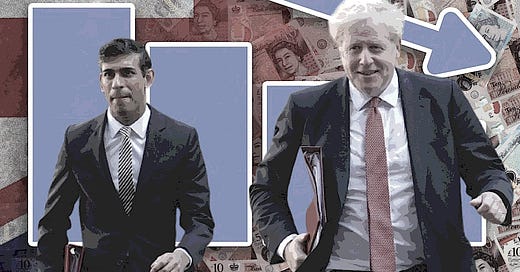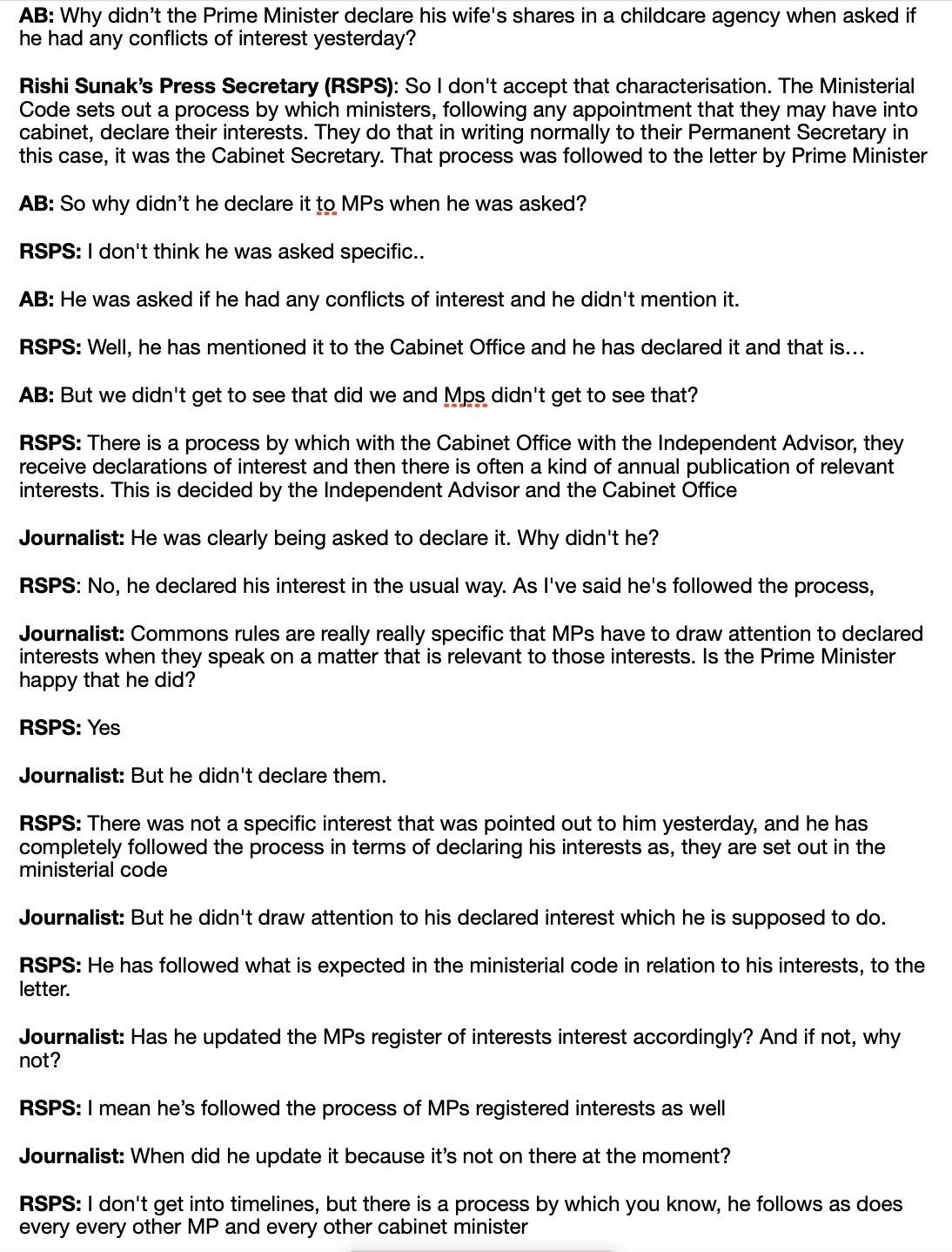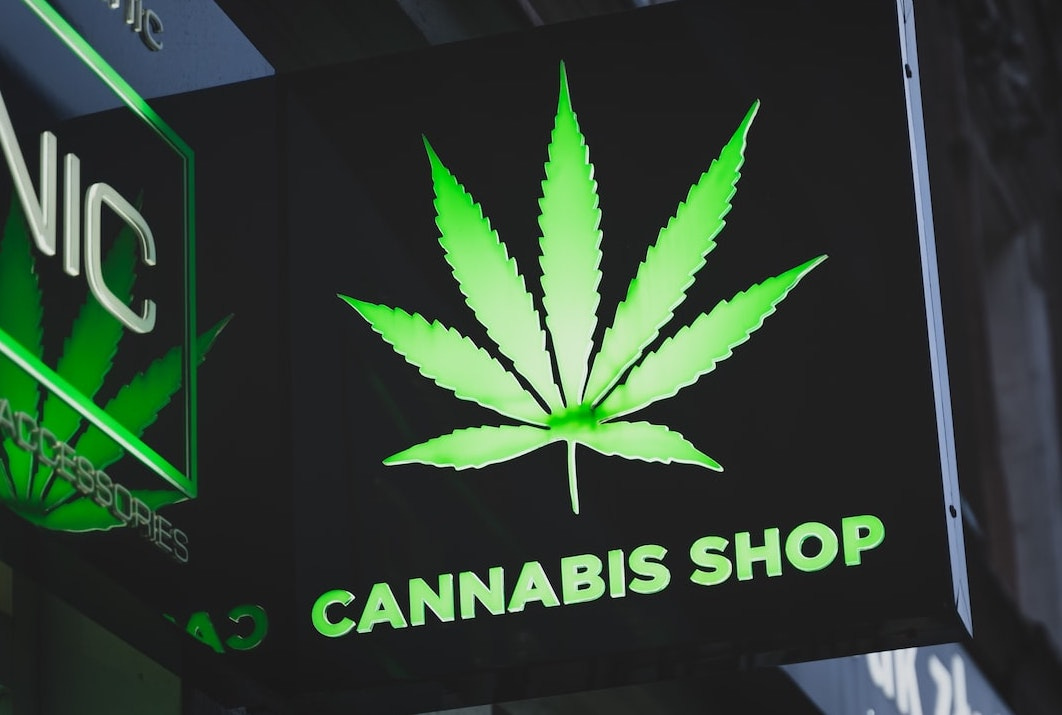The Brexit Scam: How Rishi Sunak is Hiding our National Decline
The Prime Minister's false claim that his new trade deal with Pacific nations is a major "benefit of Brexit" is a straightforward deception
In this week’s Bienkov Briefing
RISHI SUNAK’S NEW BREXIT SLEIGHT OF HAND
DOWNING STREET DODGES CONFLICT OF INTEREST QUESTIONS
EXCLUSIVE BYLINE POLL: VOTERS BACK CANNABIS LEGALISATION
VOTERS SAY LABOUR BEST ON CRIME AND IMMIGRATION
Rishi Sunak announced with great fanfare overnight that the UK has unleashed the “benefits of Brexit” by signing a new trade deal with Pacific nations.
“As part of CPTPP, the UK is now in a prime position in the global economy to seize opportunities for new jobs, growth and innovation," the Prime Minister said.

However, a quick look at the details of the deal reveal that these supposed “benefits of Brexit” are entirely non-existent.
In reality the UK already has free trade deals in place with nine of the 11 countries included in the partnership.
And while the UK does conduct significant trade with some of these nations, the sheer distances involved means that any potential benefits from this deal entirely pale in comparison to the huge amount of trade and growth we have lost by leaving the EU.
In fact according to the UK Government’s own figures, the CPTPP will add just 0.08% to the size of Britain’s economy over ten years. This compares to the estimated 4% that the UK is set to lose due to leaving the EU.
And unlike the EU Single Market, whose operation we had direct democratic input over through the European Parliament, the operation of the CPTPP will remain almost entirely outside of British voters’ control.
So far from being a net “benefit of Brexit”, this deal merely demonstrates how much we have lost by exchanging our previous close trading relations with our nearest and largest market, for much looser relations with smaller markets on the other side of the world.
And as with pretty much every other claimed benefit of leaving the EU, Sunak’s latest claims fail to stand up to even the mildest of scrutiny.
What Happened to Sunak’s New Era of ‘Accountability’?
When the Prime Minister was asked this week whether he had any conflicts of interest he needed to declare around his decision to hand big new subsidies to childcare agencies, he replied, “No, all my disclosures are declared in the normal way."
We now know this was a lie. Within hours the I Newspaper had revealed that he did in fact have a massive conflict of interest due to his wife holding shares in one of the companies most set to benefit from the subsidies.
It has also since emerged that representatives from the same company his family are benefiting from, attended an event inside Downing Street just a few days ago.
On Wednesday I asked Sunak’s spokesperson directly why he had failed to declare this massive conflict of interest. Here is a transcript of the exchange.
As you can read, the responses from Sunak’s spokesperson reveal the absurd lengths to which his operation have gone to in order to hide from the “accountability” that the Prime Minister previously promised he would personally champion.
Rather than face up to the simple fact that Sunak had a massive conflict of interest which he failed to declare, Downing Street instead insist he has followed the rules “to the letter”, while ignoring all of the evidence that he quite obviously has not.
As with the latest deceptive claims about the “benefits of Brexit” the promised new era of “accountability” under this Prime Minister is looking increasingly like a mirage.
EXCLUSIVE POLL: Voters Want Cannabis Legalised
The Government this week confirmed plans to ban the recreational use of laughing gas, despite being advised by its own advisory council that doing so would be “disproportionate” and lead to adverse social harms.
New polling commissioned by the Byline Supplement suggests that the move is likely to be popular. According to Omnisis 73% of voters support the ban, with just 14% disagreeing.
However, while voters clearly want an end to the presence on the streets of the little canisters associated with the gas, they take a notably different attitude when it comes to cannabis.
According to our poll, a majority of UK voters now support the full legalisation of cannabis, with 55% saying it should be legalised, compared to just 32% who disagree.
Support for legalisation is strongest among under 40s, but remains strong among all age groups, with the single exception of voters over the age of 75.
Even Conservative party voters are more likely to back legalisation than oppose it, with just 40% saying they would not like to see it legalised. There is also little divide between Leave and Remain voters, with both groups almost equally backing cannabis legalisation.
Voters also take a much more measured approach when it comes to the question of which illegal and legal substances are most harmful.
Asked to pick which of a list of various substances were most harmful to public health and society, cocaine was the substance most picked by voters, followed by alcohol and then tobacco. Cannabis was next on the list, with laughing gas firmly in last place with just 6% of voters saying it was the most harmful substance.
Anti-Social Politics
Our poll also found little support for the Government’s overall record on dealing with crime and anti-social behaviour.
Almost half of voters said that anti-social behaviour had got worse in their local area over the past five years, compared to just 12% who said it had decreased.
Meanwhile, when asked to choose which of the two major parties would be best at dealing with the issue, 43% picked Labour, compared to just 25% who picked the Conservative Party.
This comes on top of other polling commissioned by Byline this week, showing that voters also believe Labour would be best at dealing with the issue of immigration.
The poll also found little support for the Home Secretary herself, with just 15% of voters saying they approve of the job Suella Braverman is doing.








What is preventing people in the UK from demanding a Brexit redo? They didn’t know at the time how many people were under the spell of active measures … and secondly, if you do progress on the cannabis industry, make sure Russian oligarchs are prevented from investing. In the states, it’s a money laundering industry for the Bratva … which explains Dana Rohrabacher’s zest for cannabiz
Questions you might also ask:
1. As a nation we voted for Brexit, why didn’t we get a vote for this?
2. What fresh regulations will need to be enacted to make this work?
3. While we’re talking about conflicts, can you explain how the investment fund in which you have a stake and which made large capital gain during the pandemic was able to benefit from COVID vaccine production and use? (Hint: it had stakes in Moderna at critical times)